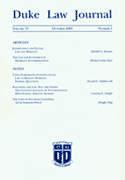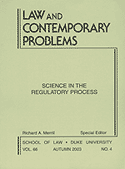Duke Law scholarly journals publish new works
Three of Duke Law School’s distinguished scholarly journals recently announced the publication of new works. Duke Law Journal and Law and Contemporary Problems recently published volumes addressing criminal and constitutional law and science, technology and the law, respectively, while Duke Law & Technology Review published an iBrief by Duke Law student Jennifer Miller ’04 titled " Should Juries Hear Complex Patent Cases?"

The Duke Law Journal features a piece by Mitchell N. Berman, Bernard J. Ward Centennial Professor of Law at the University of Texas at Austin, titled “Justification and Excuse, Law and Morality.” The article examines justification and excuse defenses in criminal cases, which “constitutes a case study in the complex relationship between legal and moral reasoning.” Berman teaches and writes in criminal law and constitutional law, focusing on the philosophy of criminal law and constitutional theory. Before joining the Texas faculty in 1998, Berman clerked for the Honorable J. Dickson Phillips, Jr. of the U.S. Court of Appeals for the Fourth Circuit, and practiced law with Jenner & Block in Washington, D.C. The volume also features an article, "The Law and Economics of Disability Accommodations," written by Michael Ashley Stein. Stein, an associate professor of law at William & Mary, received his Ph.D. from Cambridge University and his J.D. from Harvard. The piece examines and analyzes how the vague definition of "reasonable" disability accommodations should be measured. To read these articles and to view a complete copy of Duke Law Journal Vol. 53, No.1, please visit the Duke Law Journal website.
 Another Duke Law journal, Law and Contemporary
Problems, recently published Vol. 66, No. 4, titled “Science in the Regulatory Process,” which features Richard A. Merrill as special editor. All of the articles in this issue
address "the role that science - specifically, information created by scientists - does and should play in decisions by federal regulatory agencies."
Another Duke Law journal, Law and Contemporary
Problems, recently published Vol. 66, No. 4, titled “Science in the Regulatory Process,” which features Richard A. Merrill as special editor. All of the articles in this issue
address "the role that science - specifically, information created by scientists - does and should play in decisions by federal regulatory agencies."
Merrill, who writes an intriguing foreword to this volume, is Daniel Caplin Professor of Law at the University of Virginia and a known expert in administrative, environmental, and food and drug law. He has been a consultant to the Office of Technology Assessment of the U.S. Congress, the White House Office of Science and Technology Policy and the Environmental Protection Agency. Merrill currently is a member of the Institute of Medicine Board on Health Sciences Policy and is co-chair of the National Academies Program on Science, Technology, and Law. Please visit the Law and Contemporary Problems website to view the volume.
Duke Law & Technology Review is a scholarly journal published entirely online, which provides academics the ability to voice their opinions quickly and to have timely discussions about current events. This unique publication focuses on a number of legal specialties: intellectual property, business law, free speech and privacy, telecommunications, criminal law among others. Its most recent article is by Duke Law student Jennifer Miller ’04, and it discusses the constitutionality of the so-called "complexity exception" to the Seventh Amendment, which would give a judge the right to deny jury trials in civil cases which are deemed too complex for juries to understand. This article, among others, can be read at the Duke Law & Technology Review website.
Duke Law School has seven student-run journals, each of which offers its own unique way of presenting legal scholarship. Journals are published frequently throughout the academic year, as student editors and staff select among hundreds of submissions to produce each volume. Duke Law School has been publishing legal theory in journal format since 1933, when Law and Contemporary Problems started a trend that now includes six print journals and one eJournal. Thousands of subscribers worldwide read Duke Law journals regularly, and thousands more access its articles via journal Web sites that provide full-text, fully searchable versions, and via online research databases like Lexis and WestLaw. For more information or to subscribe to any of the Duke Law School journals, please contact Brett Cornwright, Director of Publications.